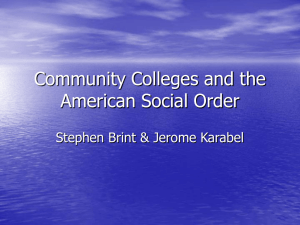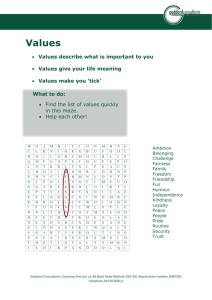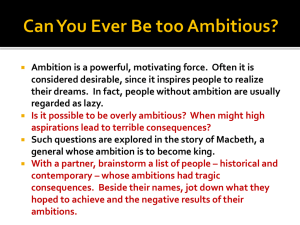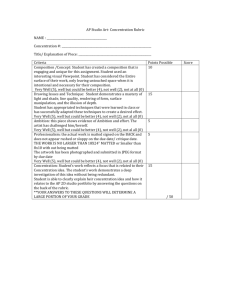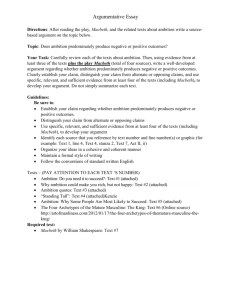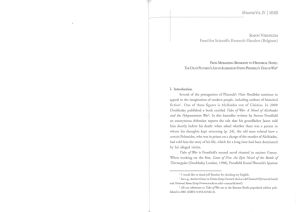POSC 258: POLITICS AND AMBITION Laurence Cooper Spring
advertisement
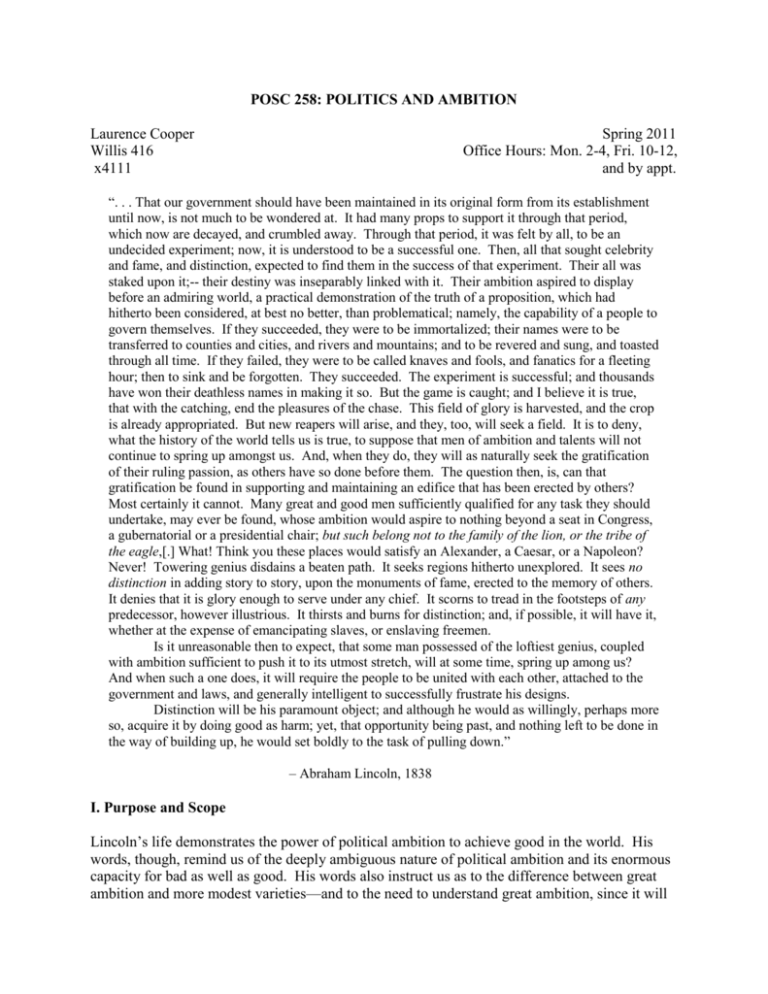
POSC 258: POLITICS AND AMBITION Laurence Cooper Willis 416 x4111 Spring 2011 Office Hours: Mon. 2-4, Fri. 10-12, and by appt. “. . . That our government should have been maintained in its original form from its establishment until now, is not much to be wondered at. It had many props to support it through that period, which now are decayed, and crumbled away. Through that period, it was felt by all, to be an undecided experiment; now, it is understood to be a successful one. Then, all that sought celebrity and fame, and distinction, expected to find them in the success of that experiment. Their all was staked upon it;-- their destiny was inseparably linked with it. Their ambition aspired to display before an admiring world, a practical demonstration of the truth of a proposition, which had hitherto been considered, at best no better, than problematical; namely, the capability of a people to govern themselves. If they succeeded, they were to be immortalized; their names were to be transferred to counties and cities, and rivers and mountains; and to be revered and sung, and toasted through all time. If they failed, they were to be called knaves and fools, and fanatics for a fleeting hour; then to sink and be forgotten. They succeeded. The experiment is successful; and thousands have won their deathless names in making it so. But the game is caught; and I believe it is true, that with the catching, end the pleasures of the chase. This field of glory is harvested, and the crop is already appropriated. But new reapers will arise, and they, too, will seek a field. It is to deny, what the history of the world tells us is true, to suppose that men of ambition and talents will not continue to spring up amongst us. And, when they do, they will as naturally seek the gratification of their ruling passion, as others have so done before them. The question then, is, can that gratification be found in supporting and maintaining an edifice that has been erected by others? Most certainly it cannot. Many great and good men sufficiently qualified for any task they should undertake, may ever be found, whose ambition would aspire to nothing beyond a seat in Congress, a gubernatorial or a presidential chair; but such belong not to the family of the lion, or the tribe of the eagle,[.] What! Think you these places would satisfy an Alexander, a Caesar, or a Napoleon? Never! Towering genius disdains a beaten path. It seeks regions hitherto unexplored. It sees no distinction in adding story to story, upon the monuments of fame, erected to the memory of others. It denies that it is glory enough to serve under any chief. It scorns to tread in the footsteps of any predecessor, however illustrious. It thirsts and burns for distinction; and, if possible, it will have it, whether at the expense of emancipating slaves, or enslaving freemen. Is it unreasonable then to expect, that some man possessed of the loftiest genius, coupled with ambition sufficient to push it to its utmost stretch, will at some time, spring up among us? And when such a one does, it will require the people to be united with each other, attached to the government and laws, and generally intelligent to successfully frustrate his designs. Distinction will be his paramount object; and although he would as willingly, perhaps more so, acquire it by doing good as harm; yet, that opportunity being past, and nothing left to be done in the way of building up, he would set boldly to the task of pulling down.” – Abraham Lincoln, 1838 I. Purpose and Scope Lincoln’s life demonstrates the power of political ambition to achieve good in the world. His words, though, remind us of the deeply ambiguous nature of political ambition and its enormous capacity for bad as well as good. His words also instruct us as to the difference between great ambition and more modest varieties—and to the need to understand great ambition, since it will always be enormously consequential. Each of these themes will figure prominently in this course. When and how is personal ambition a threat to peace and the public good, and when and how is it a prod to nobility and heroism? When and how does it exemplify the opposition between self and society, and when and how does it represent their intersection and mutual support? And can it do both at the same time? How should society deal with the intrinsically dangerous phenomenon of great ambition—should we educate it? try to moderate it? channel it or check it through institutions? diminish or even eliminate it? Finally (looking beyond Lincoln’s speech), what are the inner nature and sources of political ambition: what do the ambitious really want, and do they experience fulfillment when they achieve their ambitions? These are some of the major questions around which our investigation will be structured. II. Course Requirements The most important course requirement is that you read all assigned texts closely and before class. The readings will be of varying length and difficulty, but they will always demand—and success in the course will demand—careful attention and review. You should come to class prepared to discuss what you’ve understood and prepared to ask about what you haven’t understood. Course grades will be determined by three papers (30% each) and class participation (10%). As part of your class participation you will be required to make an oral presentation and lead discussion in one class session. You are also expected to contribute regularly to class discussion throughout the term. III. Academic Honesty Strict standards of academic integrity will be upheld in this class. Your signature on a test or assignment means that you have neither given nor received unauthorized aid. Students who are found to have violated this standard can expect severe sanctions. IV. Assigned Texts The following books are available for purchase at the bookstore: Plutarch, Greek Lives Francis Fukuyama, The End of History and the Last Man Shakespeare, Macbeth Shakespeare, Julius Caesar Xenophon, The Education of Cyrus David Johnson, Socrates and Alcibiades: Four Texts Plato, Symposium Other required readings will be on eReserve at the Library (password: POSC). 2 V. Class Schedule This is an approximate schedule. We may depart from it if class discussions, etc. so require. A. Introduction March 29: Plutarch, “Alexander” (Greek Lives, pp. 312-81) B. The Problem of Ambition: A Philosophic Survey March 31: Fukuyama, chapters 13-19; and Kojve, “In Place of an Introduction” (eReserve) **Recommended for ambitious students: selection from Hegel (on eReserve)** April 5: Fukuyama, chapters 27-31; also read selection from Nietzsche (eReserve) C. Ambition and Democracy April 7: Classical democracy: Pericles’ funeral oration, as recounted by Thucydides (eReserve) **Recommended: Plutarch, “Pericles” (Greek Lives, pp. 144-79)** April 12: Modern democracy 1: Liberal democratic statesmanship: read selections from the American Founders and Lincoln (eReserve) April 14: Modern democracy 2: read selections from Franklin and Tocqueville (eReserve) D. Ambition and Lawlessness April 19: Shakespeare, Macbeth April 21: Shakespeare, Julius Caesar E. Ambition and Empire April 26: Xenophon, The Education of Cyrus, Book I April 28: Xenophon, The Education of Cyrus, Books II and III May 3: Xenophon, The Education of Cyrus, Books IV and V May 5: Xenophon, The Education of Cyrus, Books VI and VII May 10: Xenophon, The Education of Cyrus, Book VIII May 12: Xenophon, The Education of Cyrus, conclusion (no additional reading) 3 F. The Soul of Ambition **Recommended preliminary reading: Plutarch, “Alcibiades” (Greek Lives, pp. 222-59)** May 17: Plato, Alcibiades I, 103a-114b, in Johnson, trans, Socrates and Alcibiades (NOTE: because the Greek text sometimes translates awkwardly into English, an alternate translation is on available eReserve) May 19: Plato, Alcibiades I, 114b-124b May 24: Plato, Alcibiades I, 124b-135e May 26: Plato, Symposium, 172a-178a and 198a-212c May 31: Plato, Symposium, 212c-223d VI. Due dates First paper due at 4:00 PM on Friday, April 22 Second paper due at 4:00 PM on Monday, May 16 Third paper due at 4:00 PM on Monday, June 6 4
